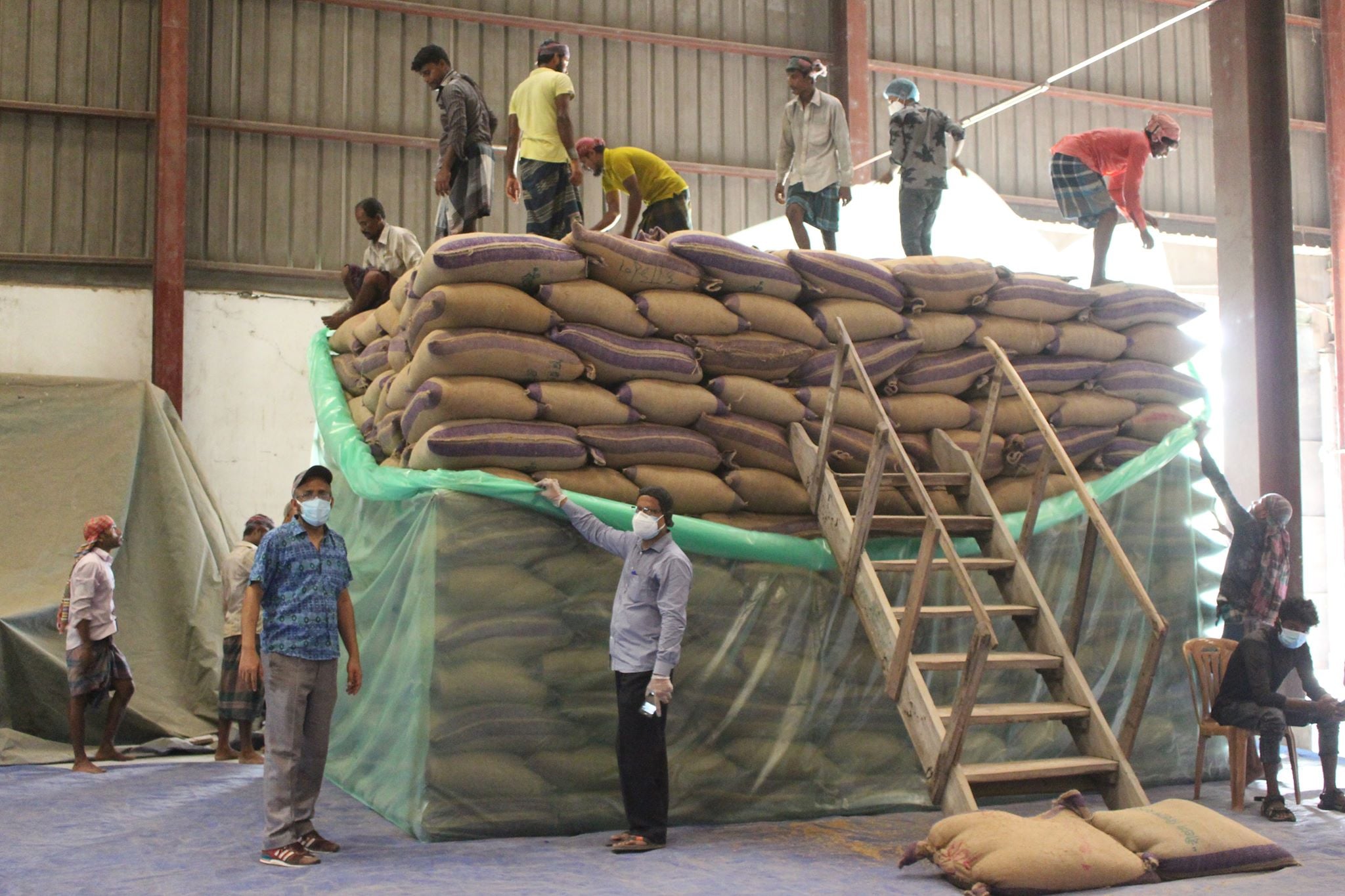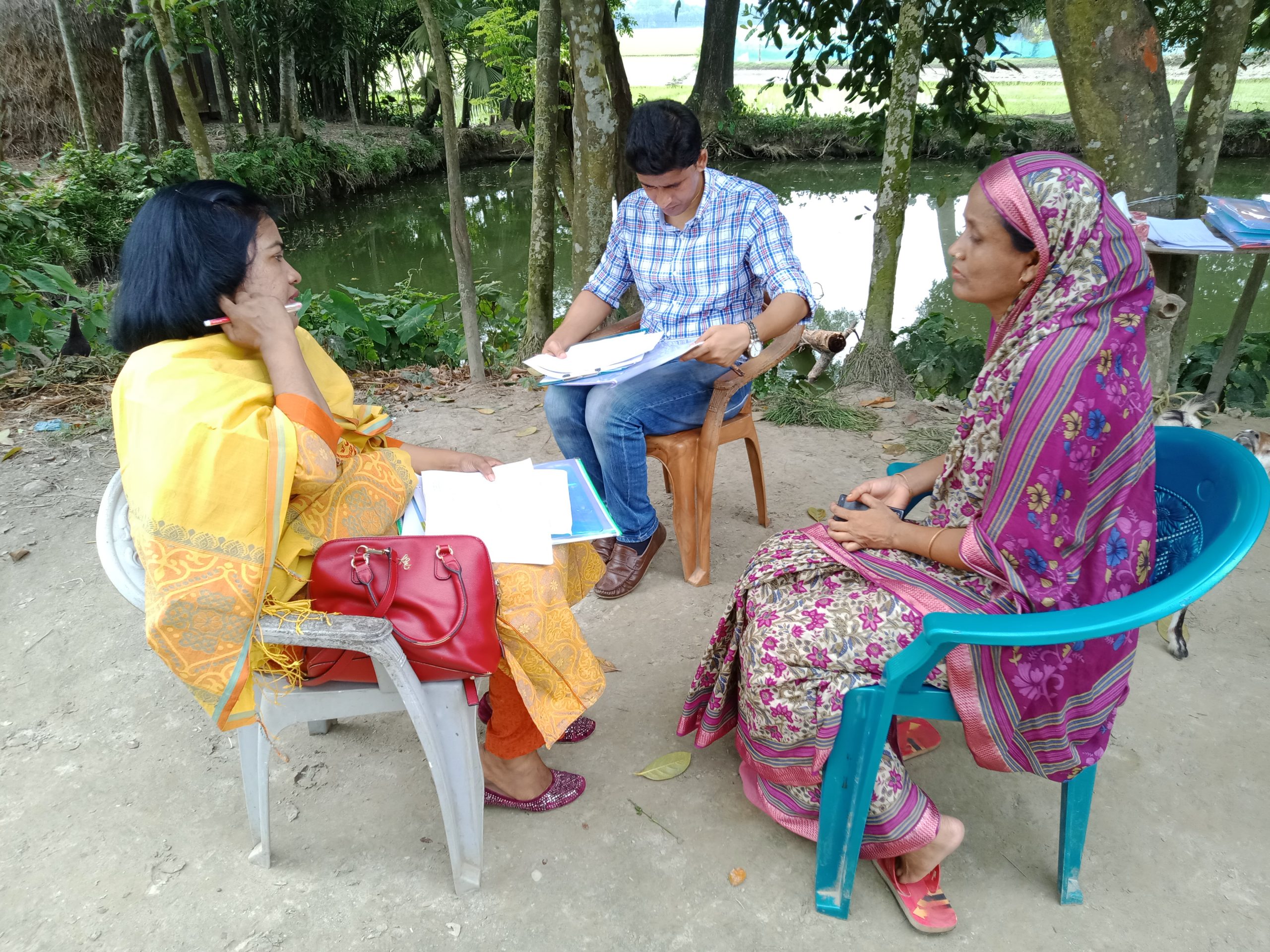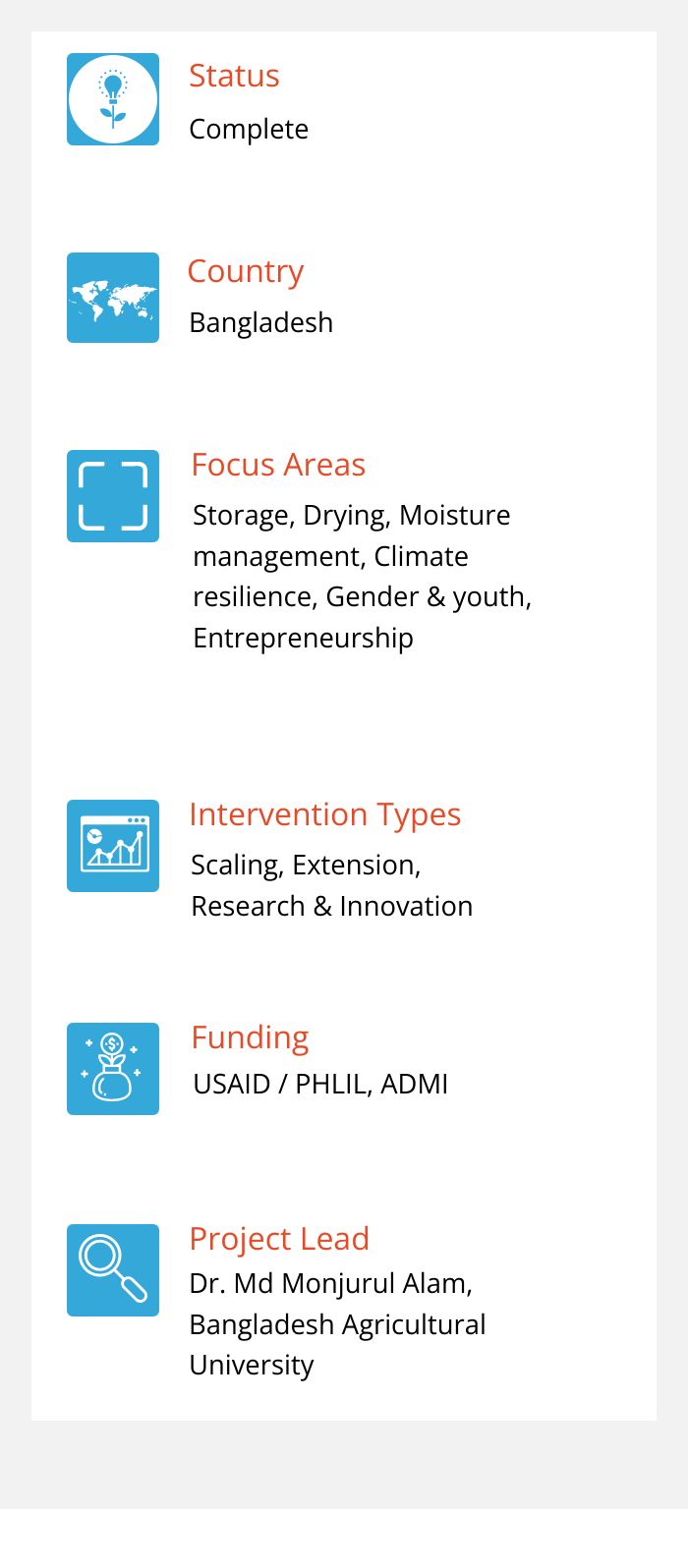Scaling Up Postharvest Technologies to Improve Drying and Storage Options in Bangladesh
Background
This project is part of the Feed the Future Innovation Lab for the Reduction of Post-Harvest Loss (PHLIL) Phase 2 led by Kansas State University. PHLIL is a strategic, applied research and education program aimed at improving global food security by reducing post-harvest losses in stored product crops. ADMI is a subawardee in the PHLIL project and works with Bangladesh Agricultural University (BAU), University of Illinois-based AgReach, and Assistant Professor Matt Stasiewicz to achieve objectives within the PHLIL project.
Project Information
The PHLIL-Bangladesh project is led by Bangladesh Agricultural University (BAU) working in cooperation with the ADM Institute for the Prevention of Postharvest Loss. Dr. Md Monjurul Alam is the project investigator, and team members at BAU include Dr. Chayan Kumer Saha, Dr. Md Abdul Awal, Dr. Md Rostom Ali, and Dr. Ismat Ara Begum.
The project works to achieve the following:
- Modify BAU-STR dryer to use liquid petroleum gas (LPG) as a fuel source
- Develop an appropriate scale dryer and mycotoxin testing for use on parboiled paddy rice for small-medium sized paddy traders and rice mills
- Test and promote hermetic storage for seed in collaboration with the Bangladesh Government
- Ensure that opportunities are available for women and youth to contribute to and benefit from PHLIL post-harvest interventions
- Implement an engagement strategy that reaches out to key stakeholders
- Continue to promote and scale the BAU-STR dryer developed in PHLIL Phase I
Project Progress
Modifying and scaling up small-scale dryers
Starting in 2019, BAU’s approach to scaling the BAU-STR dryer has included:
- Modifying the fuel source of the BAU-STR dryer to use liquefied petroleum gas (LPG): In addition to being a cleaner-burning fuel, LPG is widely available in Bangladesh, enabling easy fuel accessibility. Farmers requested the LPG modification in spite of the slightly higher cost, since it simplifies the dryer’s operation. By using LPG, farmers save time they would have used feeding rice-husk briquettes into the burner to maintain a consistent temperature.
- Scaling adoption through focus on farmer organizations and public-private partnerships: Farmer organizations enable smallholders to more easily access and manage information, inputs, and markets, ultimately leading to lower costs and higher profits for individual farmers. BAU worked with two Bangladesh Ministry of Agriculture projects to scale the BAU-STR dryer with farmer organizations known as Common Interest Groups. In partnership with the Department of Agricultural Extension’s (DAE) Integrated Agricultural Approach for Ensuring Nutrition and Food Security project, 184 farmer organizations in six districts each received a BAU-STR dryer. In 2020, DAE plans to distribute 1,400 additional LPG fuel-source BAU-STR dryers. Additionally, in partnership with FAO’s Missing Middle Initiative, the dryer was distributed to seven farmer organizations in two districts. Mechanized drying creates value for smallholders in these groups, because the selected districts are prone to flash floods, as well as rain during the spring harvest. In both projects, BAU worked with local manufacturers to provide the dryers, provided technical assistance, and conducted train-the-trainer workshops for sub-assistant agricultural officers and other trainers. BAU continues to monitor these farmer organizations and provide technical support as needed.
- Building local fabricator capacity: Over the duration of PHLIL phases 1 and 2, BAU has invested in building the capacity of local manufacturers and fabricators such as Bhai Bhai Engineering and Kamal Machine Tools. These agricultural machinery manufacturers have received hands-on training to design and manufacture the BAU-STR dryers and are now manufacturing dryers at scale for distribution to farmer organizations and other interested buyers.
Scaling up off-farm dryers
In collaboration with small and meso-scale private sector millers, BAU is also developing a recirculating batch grain dryer. Bangladesh has about 14,500 small and medium scale private rice husking mills, which together account for 45% of total paddy production in the country. These millers typically dry grain in open air and face challenges when drying during the rainy Boro and Aus seasons. They report an increasing tendency for farmers to sell “wet paddy”, which is difficult for millers to accept in the absence of mechanized dryers. Enabling traders and millers to dry and store more effectively can help address smallholders’ problem of finding a market at the Boro harvest.
BAU is collaborating with Moti Auto Rice Mill, a small-scale private sector rice milling enterprise, to develop and manufacture a local recirculating batch grain dryer design with locally available parts and components. After conducting a needs assessment, BAU researchers have identified the need for a 12-ton capacity paddy dryer. BAU has established a cost-share partnership with Moti auto rice mill, who will be providing $50,000 to develop the dryer for the mill and install it in on the premises. This dryer will also serve as a research and demonstration site. This activity has potential for manufacturing and scaling batch dryers to other mills, large-scale farmers, and traders.

Promoting large-scale adoption of hermetic storage
In Phase 1, BAU focused on farm-level hermetic storage adoption. In Phase 2, the focus has shifted to assessing the effectiveness of using hermetic storage for large-scale seed storage in partnership with Bangladesh Agricultural Development Corporation (BADC) seed processing centers.
In 2019, BAU examined the technical and financial performance of hermetic bags for seed storage compared with BADC’s traditional seed storage system. The experiments used a randomized design and were performed in two seed processing centers in Mymensingh and Tangail over the Boro and Aman seasons with 180 hermetic bags. Due to BADC’s practices of fumigation, spraying, re-drying and re-lotting, experimental results did not indicate insect infestation and showed minor differences in moisture content. However, researchers saw significant changes in seed germination rates, with hermetic storage offering high germination rates of 88% in comparison to 81-85% observed with traditional storage methods.
Furthering adoption of hermetic bags for paddy seed storage among smallholder farmers
BAU has helped pioneer the ADMI Grain Handling System technique of pairing hermetic bag use with a community or group level BAU-STR dryer. In 2019, BAU distributed 108 hermetic bags for storing paddy seed among farmers in the Mymensingh, Bagura, and Barishal districts through four farmer groups. In the well-known Maria village, in Bagura district, BAU worked with a women-run farmer group to encourage further adoption of hermetic storage coupled with the dryer usage amongst women farmers.
Farmers received training through multiple programs, refresher trainings, and continued monitoring and technical assistance with the help of a PhD student. In addition to training on technical knowledge of using and maintaining the bags, BAU helped arrange capacity building exercises, such as weighing the grain stored and noting the grain moisture and weight. The Rural Development Activity and Ara Bangla Society collaborated with BAU to identify the groups and conduct trainings.

Gender Integration
Led by BAU economist and professor Dr. Ismat Ara Begum, BAU implemented three initiatives in 2019 to integrate gender considerations into the project with technical advice from AgReach.
- Conducting gender technology assessments of the BAU-STR dryer and hermetic bags utilizing a tool originally developed by AgReach to identify gendered impacts of the technology. The tool assesses both barriers and enablers in accessing and adopting the technology. Initial data from the assessment suggests that both technologies save women’s time and labor associated with sun drying, monitoring, and cleaning stored grain in households. Final revisions on gender technology assessments for hermetic bags and BAU-STR dryer have been completed.
- Working with a women’s group in Maria village, Bagura, by providing a dryer and hermetic bags. The women participants in Bagura are early adopters of various technologies and form a model group for testing adoption of post-harvest practices and technologies
- Training local women entrepreneurs to provide drying services to the community for a fee. Ongoing work to train local women entrepreneurs to provide fee-based drying services



